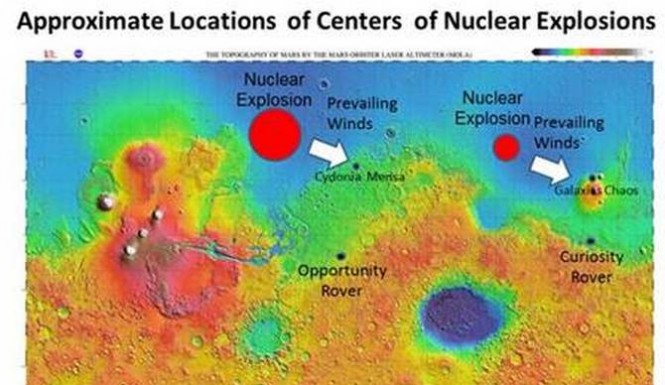And now for something completely different as the Monty Python crew liked to say. I usually try to be as accurate as I can in these posts. I welcome any feedback that will help me correct mistakes. However, sometimes you encounter what seems to be a really far out idea but a scientist is offering evidence for that idea. I just couldn't resist mentioning the proposal that there were several huge devastating nuclear explosions on Mars that heavily impacted the surface of that planet.
Dr. John Bradenburg is a senior propulsion scientist at Orbital Technologies Corporation. In a recent interview, he stated that, "The Martian surface is covered with a thin layer of radioactive substances including uranium, thorium and radioactive potassium -- and this pattern radiates from a hot spot [on Mars]... A nuclear explosion could have sent debris all around the planet," he said. "Maps of gamma rays on Mars show a big red spot that seems like a radiating debris pattern ... on the opposite side of the planet there is another red spot."
Bradenburg is suggesting that there was a natural nuclear explosion on Mars that was equivalent to a terraton of TNT (One terraton equals one million megatons) in the northern part of the Mare Acidalium region of Mars where there is a lot of radioactivity. The explosion would have thrown up the radio-isotopes which have been detected by gamma ray spectrometry. Xenon 129 is present in the Martian atmosphere. This isotope has been seen on Earth where there was a nuclear explosion or meltdown.
Skeptics say that the evidence presented by Bradenburg is ambiguous and could be accounted for by natural non-nuclear processes that took millions of years. Even if there was a natural nuclear explosion in the remote past on Mars, researching it would not take precedence over many of the current Mars projects such as the search for life.
In response, Bradenburg says that he has talked to defense specialists who agree with him that there is evidence on Mars for a massive nuclear explosion. He points out that there was a natural nuclear reactor on Earth. About two billion years ago, a water soaked uranium rich ore deposit in Gabon, Africa actually started a self-sustaining nuclear reaction.
Critics point out that any such enormous nuclear explosion on Mars would leave huge craters that should be visible today. Bradenburg says that the craters from a two hundred million year old explosion could have been completely filled with sand in the intervening years. On the other hand, if the explosion occurred above the ground like the Tunguska event in Russia about, a huge crater may not have been created.
Currently, Bradenburg is leaving the question of what could have caused such an explosion open. In the past, he has suggested that there could have been an ancient civilization on Mars that was responsible for the big nuclear explosions. Needless to say, this idea did not find a great deal of support even among scientists who say that Bradenburg has raised some valid questions about Martian surface radioactivity. While the idea of intelligent life on Mars has been popular in fiction, there has been no solid evidence found of any life on Mars beyond the possibility of microbes.
